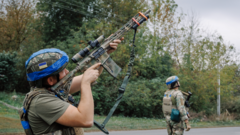Ukrainian military leadership asserts that despite Russia's claims, they continue to defend critical territory in the Kursk region, demonstrating resilience against overwhelming forces.
### Ukraine Maintains Defensive Stronghold in Kursk Region Amid Intensifying Conflict

### Ukraine Maintains Defensive Stronghold in Kursk Region Amid Intensifying Conflict
Ukrainian forces persist in holding a defensive position within Russian territory, capturing ground amid ongoing hostilities.
---
Ukraine’s top military commander, Oleksandr Syrsky, has confirmed that Ukrainian troops remain entrenched in a small area of the Kursk region, a territory they initially captured during a surprise operation in August 2024. This offensive allowed Ukraine to take control of over 1,000 square kilometers, marking a significant advancement into Russian-held land.
Syrsky reported that around 10,000 Russian soldiers are actively attempting to reclaim dominance over the area but maintains that Ukraine is still firmly retaking control of approximately 90 square kilometers. Syrsky emphasized their strategic commitment, stating, “We will continue,” as they focus their efforts on military targets rather than civilian structures.
The swift Ukrainian incursion began on August 6, 2024, leading to the capture of numerous villages and increasing the operational buffer zone to hinder Russian deployments in essential warfront regions in eastern Ukraine. While Ukrainian forces initially made significant progress, subsequent heavy reinforcements from Russia, including contributions from North Korea, have led to a slowdown in advancements and even tactical retreats in recent months.
The conflict has seen continuous escalation, with reports of up to 70,000 Russian troops engaged in aggressive counter-offensives, often involving heavy drone assaults targeting Ukrainian positions. In the past year, an estimate from Western officials revealed that more than 1,000 North Korean troops stationed in Kursk have lost their lives combatting the Ukrainian forces.
Recent collaboration between Moscow and Pyongyang has seen North Korea promise additional military assistance, including the deployment of mine-clearing units to restore infrastructure damaged during clashes. This ongoing engagement in the Kursk region underscores both sides' resolve as they navigate the complexities of the ongoing conflict in Ukraine.
Ukraine’s top military commander, Oleksandr Syrsky, has confirmed that Ukrainian troops remain entrenched in a small area of the Kursk region, a territory they initially captured during a surprise operation in August 2024. This offensive allowed Ukraine to take control of over 1,000 square kilometers, marking a significant advancement into Russian-held land.
Syrsky reported that around 10,000 Russian soldiers are actively attempting to reclaim dominance over the area but maintains that Ukraine is still firmly retaking control of approximately 90 square kilometers. Syrsky emphasized their strategic commitment, stating, “We will continue,” as they focus their efforts on military targets rather than civilian structures.
The swift Ukrainian incursion began on August 6, 2024, leading to the capture of numerous villages and increasing the operational buffer zone to hinder Russian deployments in essential warfront regions in eastern Ukraine. While Ukrainian forces initially made significant progress, subsequent heavy reinforcements from Russia, including contributions from North Korea, have led to a slowdown in advancements and even tactical retreats in recent months.
The conflict has seen continuous escalation, with reports of up to 70,000 Russian troops engaged in aggressive counter-offensives, often involving heavy drone assaults targeting Ukrainian positions. In the past year, an estimate from Western officials revealed that more than 1,000 North Korean troops stationed in Kursk have lost their lives combatting the Ukrainian forces.
Recent collaboration between Moscow and Pyongyang has seen North Korea promise additional military assistance, including the deployment of mine-clearing units to restore infrastructure damaged during clashes. This ongoing engagement in the Kursk region underscores both sides' resolve as they navigate the complexities of the ongoing conflict in Ukraine.





















